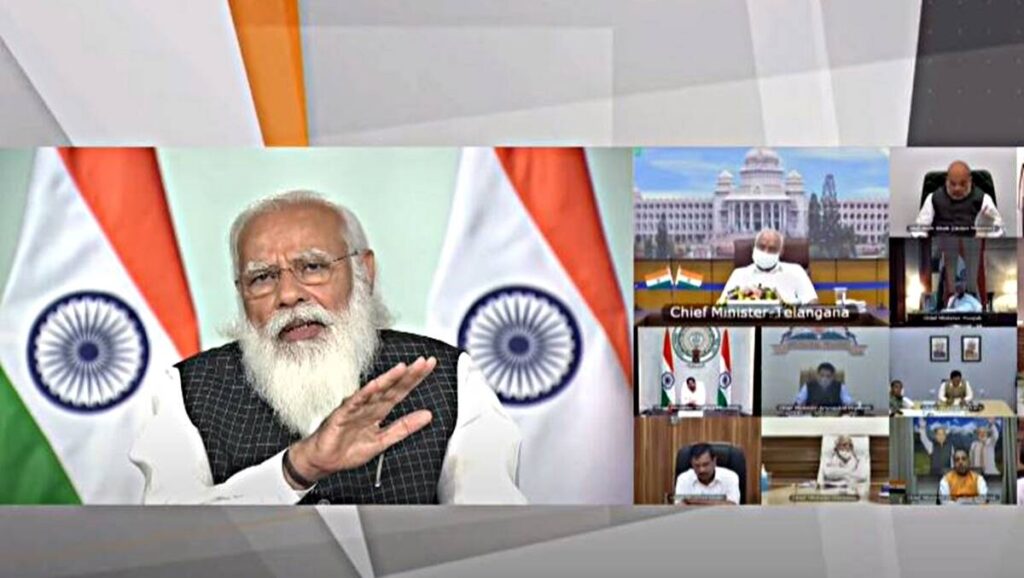Lockdowns should be avoided entirely, the PM told chief ministers at the Covid virtual meeting, armed with experience managing the first wave, improved health infrastructure, and a locally manufactured vaccine. Recognizing that India was in the grip of a serious public health crisis that had surpassed the first wave of the Covid-19 pandemic, Prime Minister Narendra Modi urged state governments on Thursday to test more, even if it meant increased infection reporting.
“In the final stages of the infection, we had to impose lockdowns because we lacked the infrastructure to control the infection: no PPE suits, not enough sanitizers, masks… we are no longer facing those shortages.” As a result, he believes that micro-containment zones should be the strategy.
The Prime Minister, sounding a note of caution, asked states to put a stop to the rise in cases on a war footing, emphasizing that efforts must be stepped up in the next three to four weeks. “At this point in time, people are becoming more relaxed. We cannot afford the administration’s fatigue and laxity. “We must fight this wave as if it were a war,” he said. The Prime Minister did not directly address several states’ complaints about vaccine shortages. Instead, he urged young people to go out and spread the word about vaccinations, particularly among vulnerable populations.
Maharashtra, Chhattisgarh, Karnataka, UP and Kerala together account for 74.13 per cent of India’s total active cases. Two chief minister – Mamata Banerji (West Bengal) because she was busy with elections; and Pinarayi Viajayan (Kerala) who tested positive for Covid on Thursday – did not attend the meeting.
In announcing the ‘teeka utsav’ (vaccination festival) from April 11 to 14, the PM also asked state governments to involve governors and all levels of elected representatives in motivating people to get their children vaccinated.
In reference to the first wave of Covid, he stated that the war was won because there was no vaccine. He emphasized the importance of testing alongside other Covid protocols such as mask and social distancing, referring to vaccination as a long-term exercise.
He urged states to tighten governance, streamline testing and vaccination, and prioritize micro containment zones. “Those who want to play politics will play politics,” he said as squabbles between the Centre and many states over vaccine shortages heated up. Several states have demanded greater autonomy in the vaccine administration strategy, while others have stated that they simply do not have enough stock.
Health Minister Harvardhan claimed there was no shortage and charged that states had mismanaged even existing stocks, claiming that Punjab, Maharashtra, and Delhi had failed to reach even the 50% mark in vaccinating senior citizens as part of the initial phase of protecting the most vulnerable from infection.
Jharkhand Health Minister Banna Gupta stated, “Around 18,27,800 vaccines were administered as the first dose, and 2,78,000 vaccines were administered as the second dose.” We have spoken with the Union Health Minister and asked him to provide us with approximately 10 lakh (1 million) vaccines for the first dose as soon as possible. We’ll have it either today or tomorrow (April 9). Approximately 83 lakh (8.3 million) people require first and second doses.
This means we’ll need approximately 1.60 crore (16 million) doses. We’re getting there gradually. We have vaccines on hand, but there has been a shortage in some areas. So we contacted the Union Health Minister. We have enough supplies for the next one to two days. We have requested the vaccine from the Union Home Minister, and I am hopeful that he will provide it to us.”
The Prime Minister’s response to suggestions from several chief ministers, including Chhattisgarh Chief Minister Bhupesh Baghel, Uddhav Thackeray, and Arvind Kejriwal, to allow all people over the age of 18 to be vaccinated, was to first finish the current round.
The Prime Minister instructed state governments to meticulously collect mortality data, as this would be an important input into granular analysis of the spread of the infection and would aid in its prevention. However, he added that testing was essential.
“To contain the virus, we must first contain the human host,” he explained. To put the RT PCR test to the test, 70% of the population must be tested. If the infection rate appeared to be high, it was a sign of the state government’s inability to deal with the problem, he explained.
But the PM said, the most important element in defeating the infection was to ensure people did not lower guard, especially if they exhibited asymptomatic indications.

